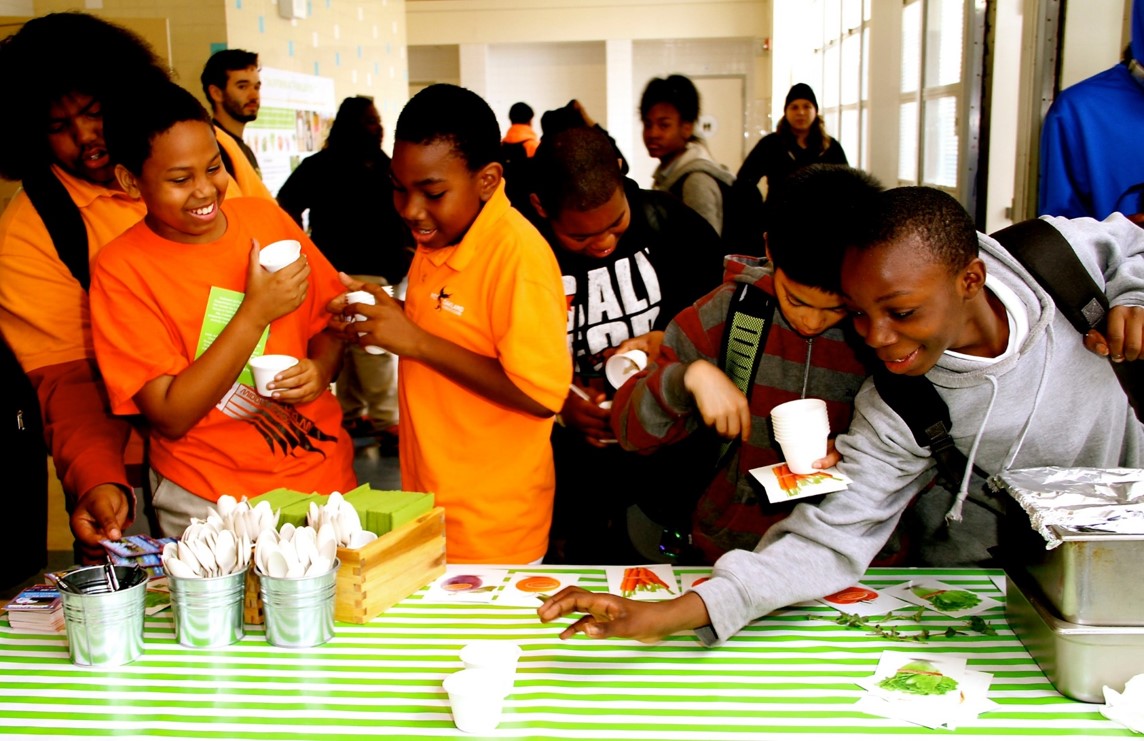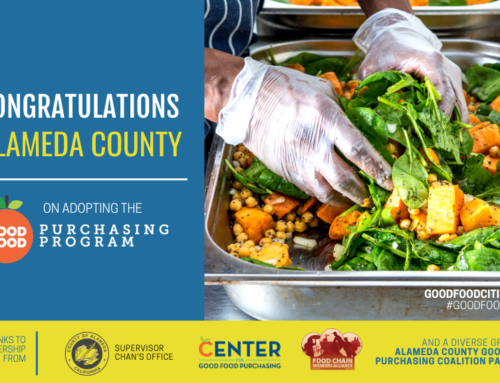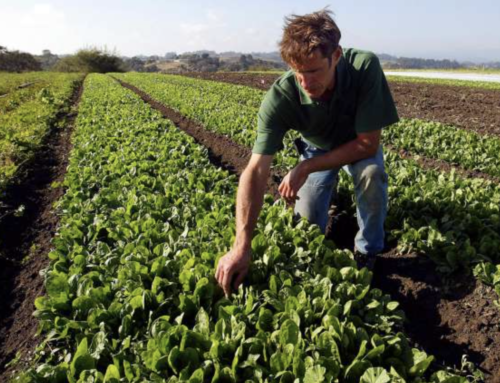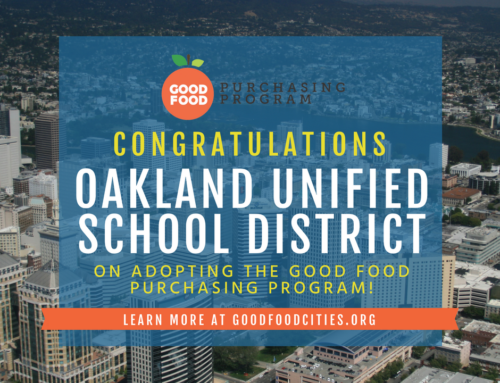On Oct. 26, the Oakland Unified School District (OUSD) will officially commit to a set of sustainability- and health-focused food purchasing standards for its district-wide meal program. These standards, outlined by the Center for Good Food Purchasing (CGFP), a Berkeley-based organization working to create a “transparent and equitable food system.”
Unlike organizations that do things like certify organic or non-GMO products, the CGFP works directly on food procurement for large institutions, primarily school districts. It aims to establish sustainable, ethical networks between farms and public schools, which helps to get money in the hands of farmers and healthy food in the mouths of school children.
The CGFP has outlined a values-based set of standards called the Good Food Purchasing Program (GFPP), which it helps school districts to adopt. The CGFP wants institutions to pay attention in particular to five key values of food suppliers: local economies, environmental sustainability, valued workforce, animal welfare and nutrition.
In short, institutions adopting the GFPP agree to show supply-chain transparency for all minimally processed ingredients (produce, meat, fish, etc), so that it is easy to trace each product back to its origin. Institutions also agree to meet at least a baseline standard for each value category. The CGFP helps institutions get familiar with these values, and helps get their vendors up to speed with the expectations. Each institution is evaluated annually, and CGFP helps “celebrate successes,” according to CGFP Executive Director Alexa Delwiche.
The CGFP was created in July 2015 within the Los Angeles Food Policy Council, which developed the original values and standards used in the GFPP. These values were adopted by both the City of Los Angeles and the Los Angeles Unified School District in 2012. San Francisco Unified School District, and now OUSD, followed in 2016. Nationally, school districts in Chicago, Ill.; Austin, Texas; Cincinnati, Ind.; Madison, Wis.; Minneapolis/St. Paul, Minn., and New York City are looking into whether to adop the program.
“The program helps institutions implement the spirit of the policies [adopted in Los Angeles], ” said Delwiche. She and her organization help institutions set long-term and short-term goals to improve their procurement practices.
OUSD has already been working towards a more sustainable and healthy meal program. “Oakland is seen as a national leader in this work,” said Delwiche. “They’ve done a tremendous amount in the last five years.”
Starting in fall 2010, the district began offering more vegetarian meal options through a Meatless Monday program, and in 2013 launched a California Thursdays initiative, a program of the Center for Ecoliteracy, in which one meal a week is sourced entirely from California farmers and companies. Starting in fall 2012, OUSD began participating in School Food Focus’s National Learning Lab, a 26 district-large collaboration to increase purchasing of regional, antibiotic-free chicken, and reduced the usage of chopped and formed “chicken products.”
The district began working with the CGFP in spring 2014, and the organization helped OUSD to review its work, as well as “how to make an educated and informed decision about how to move forward, and how to make our progress continue,” said Jennifer LeBarre, the director of nutritional services at OUSD.
Currently OUSD sources around a quarter of its poultry through Mary’s Chickens, and some of its beef through Mindful Meats, which sells organic, pasture-raised beef from retired dairy cattle. It has introduced local seafood sourced through Real Good Fish, and has increased direct purchasing of organic produce like squash, oranges and strawberries through ALBA.
Part of the work that will happen once OUSD formally adopts this policy is working on sourcing more humanely raised meat, as well as food and other products from companies following fair-labor practices and paying a living wage. “They hadn’t had the bandwidth to take this on before,” said Delwiche. “They’re gradually making these changes.”
The district also is in conversation with a few small local farms from whom it hopes to source in the future.
OUSD has been able to afford more expensive ingredients, like Mindful Meats beef, through creative menu writing, said LeBarre. “We make use of less traditional proteins like beans. So, instead of serving a meat chili, we’ll do a meat and bean chili. We can reduce the amount of beef, but still meet our protein requirements.”
Crucially, OUSD is also finishing up construction of a new central kitchen and educational urban farm which will have space for a bakery, a meat processing facility, and a produce processing facility. The new kitchen will be open to students, who can observe the cooks at work preparing meals for the 38,099 school children. There will also be a teaching kitchen that will provide classes for students, nutrition service staff and the community.
As far as procurement standards go, the new kitchen, said LeBarre, will allow the district to do more with raw materials than it could in the limited cafeteria kitchens in schools.
This sort of work around institutional food procurement isn’t sexy, but it can have a huge impact. OUSD serves about 7,000 breakfasts, 22,000 lunches and 3,000 dinners per day. Around 68% of students are eligible for free or reduced-price meals.
And it’s not just students who benefit, said Delwiche. “As individual institutions, school districts buy lots of food,” she said. “This has significant impacts on how suppliers are doing business.” In school year 2014-15, OUSD spent over $9.1 million on food. Los Angeles Unified spends around $150 million a year.
When Los Angeles Unified adopted the policy, Delwiche said, it asked one its main suppliers, Gold Star Foods, to shift to more responsibly sourced food. “For Goldstar, this relationship is critical,” said Delwiche. “They made intentional changes with their suppliers for Los Angeles Unified, but it had a ripple effect across the 400 other school districts it supplies. … As more and more institutions adopt this policy and work toward a more unified vision, it sends a clear signal to suppliers.”
The effect was, indeed, evident in Los Angeles. Over the course of two years, LA Unified increased its use of local produce from 10% to around 60%. According to the Center for Good Food Purchasing, this shift brought $12 million into the local food economy, adding 150 new local food-processing jobs.
Delwiche also hopes that this shift in priorities will also change the conversation around how much government money goes towards public-school meals.
“We can think about how to leverage all of these institutions to advocate for higher reimbursement for meals in schools,” she said. “This can affect the national conversation.”
National organizations like Slow Food USA and the Union of Concerned Scientists, as well as Oakland-based Real Food Media have gotten involved with CGFP. Real Food Media has been working with CGFP since its inception; it helps the organization with its media outreach, web presence, and storytelling around its policies.
Real Food Media director Anna Lappé, who grew up in Oakland but now lives in Berkeley, has been particularly passionate about the project.
“It’s really inspiring … to [see] what a difference it has made over the past few years in Los Angeles,” said Lappé. “I’ve been writing and talking about food and agriculture for 15 years, and through all those years, have been working to find solutions. … The reason I am so passionate about the Good Food Purchasing Program is that I think it is one of the most exciting tools out there. The potential for broad change is huge.”
The official launch of the OUSD purchasing program will be marked by an event at the David Brower Center in Berkeley on Monday Oct. 24, co-hosted by Real Food Media. Ricardo Salvador, of the HEAL Food Alliance and the Union of Concerned Scientists, will deliver the keynote speech. A post-keynote discussion, hosted by Lappé, will feature LeBarre, as well as Doug Bloch (Teamsters Joint Council 7), Shakirah Simley (Bi-Rite Market) and Sandra Lee Fewer (San Francisco Unified Board of Education). The event will take place from 6-9 p.m. and will include cocktails and light bites. Details at Real Food Media.





